By Lambert Strether of Corrente.
Yesterday, Saturday, I had to go the mall to make a purchase, and since the four-hour round trip gives me plenty of time to read, I bought a copy of The New York Times and read it carefully. I came away discouraged. There is a lot of ruin in a great newspaper.
I used to work “the newspaper business,” several careers ago, albeit on weeklies and in production. And I came away with the sense of what a wonderful production — all senses — a newspaper is; how intricately and carefully the pieces fit together, and the craft that goes into assembling the news into a pattern that’s easily grasped by the reader. Day after day! Indeed, hundreds of years have gone into perfecting the craft of composing pages, and I still feel reading a printed, broadsheet newspaper is a more productive use of my time — if comprehension and stories I would otherwise miss or skip be the goal — than reading on a laptop, let trying to get a sense of the news flow through the teensy keyhole of a cellphone’s screen.
Media criticism has the term “blooper,” an embarrassing error. Seeking bloopers is usually a mild form of voyeurism, where on-screen indiscretions by announcers and performers are detected and ridiculed. But bloopers can also be “technical,” as when the shadow of a boom appears in the shot, or the blood-spewing machine malfunctions. Naturally, the cheaper the show, the greater the chance of bloopers. I think the ongoing ruination of the Times is shown in the bloopers I am about to present. I’m going to start with some technical bloopers in the Arts Section, and then move on to what I might term Cognitive Bloopers in the Business Section. (I’m using images that I took when I got back to the house, partly because the images make the sheer scale of the times enterprise so clear, and partly to honor the craft of print production.)
Arts Section: Technical Bloopers
Here’s a page about New York’s Metropolitan Opera; I’ve captioned the bits I want to draw attention to.
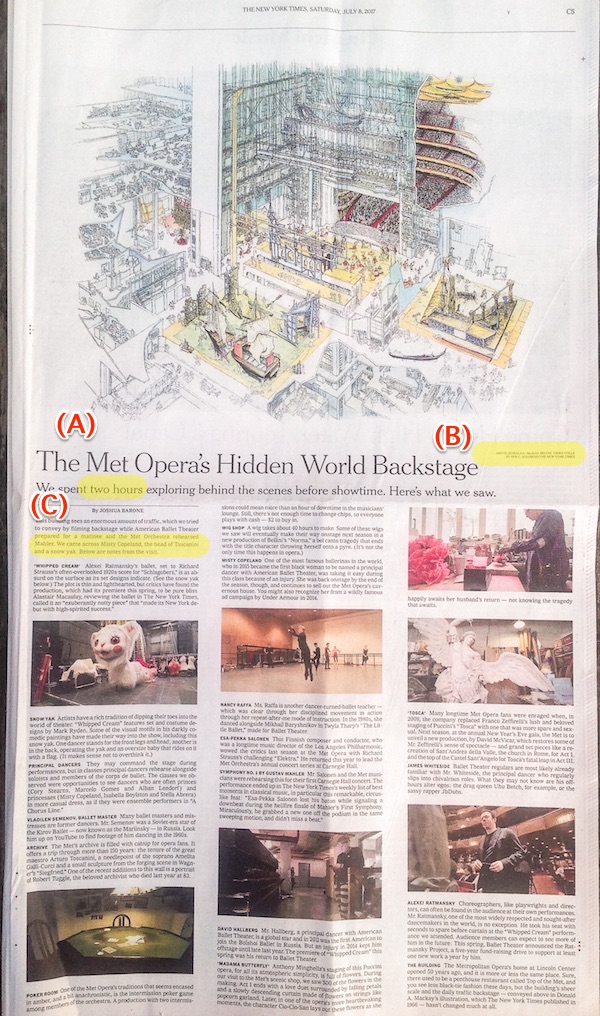
And here are enlarged clips; (A) is informational; (B) and (C) are bloopers.
| (A) | (B) | (C) |
 |

|

|
First, let’s look at this page from the production standpoint, since we know that technical bloopers stem from production. Clearly, this page must have been very cheap to produce! On the editorial side, Donald A. MacKay’s (wonderful) image was not commissioned, but plucked from the Times archives; it originally appeared in 1996. And as clip (A) tells us, the wide-eyed “reporters” were only there for two hours, on their own account encountering random stuff, which they then wrote up in the form of a listicle except without clickbait headlines; and nobody produced any copy to explain the image of the Met’s backstage; the production appears to be using three stages (colored pale yellow). How to account for that intriguing fact? Silence. It looks like the editors plunked the image down based on how pretty it was, without thinking, or helping readers to think, what it might mean. Further, still on the theme of producing the newspaper of record on the cheap, we know that Times ownership is gutting the copy editing function, and so we would expect to see copy-editing bloopers. Indeed we do.
Blooper (B). Times house style puts photo credits in small caps[1]. So how did “DONALD A. MacKAY” slip by?
Blooper (C). Readers will know where I’m going with this: “We came across Misty Copeland, the head of Toscanini and a snow yak.” A hasty reader (me) first understood “head” to be the head of a department, and only to be later tripped up by Copeland’s second career as a snow yak. Would it have been that hard to add a comma after “Toscanini,” especially for the sake of an international readership?
Bottom line: This is a cheap page, cheaply put together, very evidently seeking to minimize cost rather than maximize the value to readers.
Business Section: Cognitive Bloopers
Here’s the front page of the Business Section (and again note the masterful page makeup; probably that will be the last skill to go).
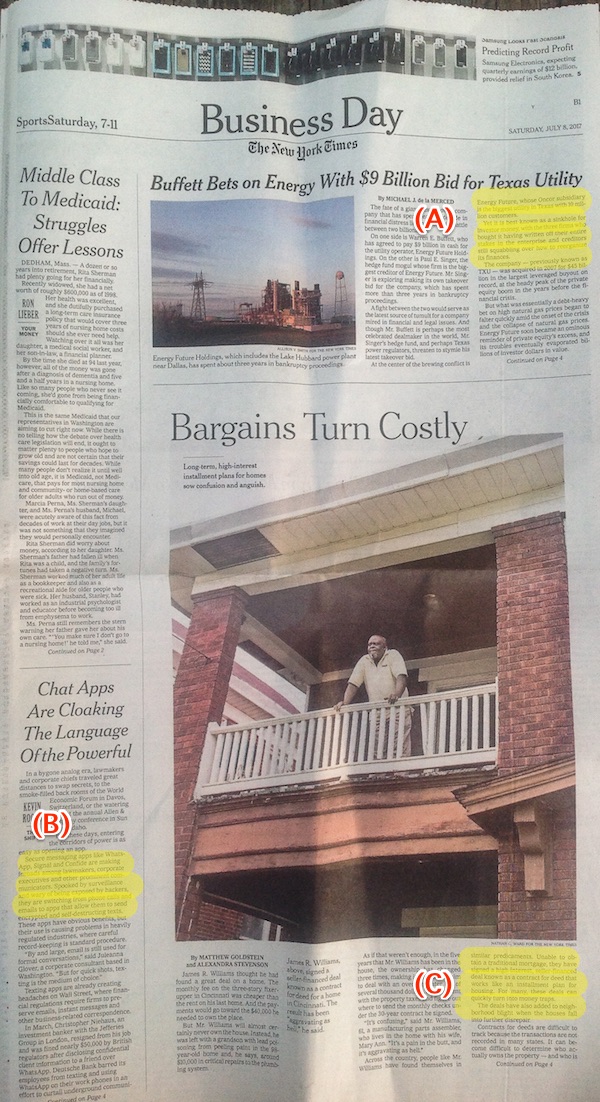
And here are enlarged clips. All are informative; putting them in context — context which ought to create cognitive dissonance at The Times, but apparently does not — creates the bloopers.
| (A) | (B) | (C) |
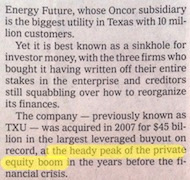
|
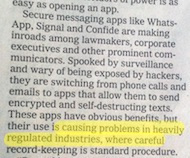
|

|
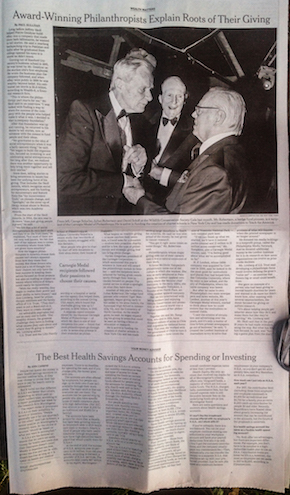
Clip (A): “…[T]he heady peak of the private equity boom in the years before the financial crisis….” Naked Capitalism readers know all about private equity!
Clip (B): “[Corporate executives and other prominent communicators] are switching from phone calls and emails to apps that allow them to send encrypted and self-destructing texts. These apps have obvious benefits, but their use is causing problems in heavily regulated industries, where careful record-keeping is standard procedure.”
Clip (C): “Unable to obtain a traditional mortage, they have signed a high-interest, seller-financed deal known as a contract for deed, that works like an installment plan for housing. For many, these deals can quickly turn into money traps.”
A hasty reader of the front page of the Times Business Section might conclude that the world of business is driven by financial blowback from crooks in the 90s, executives who seek to avoid scrutiny at all costs, and the same sort of scams that led to the foreclosure crisis (fortunately not levered (I assume)).
Flipping further into the Business Section we come to our first cognitive blooper: An entire page[2] (at right) of hagiography on squillionaire philanthropists, whose clever ownership structures have apparently insulated them from all the crookedness and sleaze (laudably) exposed on the Section’s front page. (Unless philanthropy exists for reputation laundering, of course. Not that there’s anything wrong with that!) But how does the Times live with the cognitive dissonance?
And if we scan elsewhere in the paper, we find more cognitive bloopers:
| DNC | Intelligence Agencies |
 |

|
Clip “DNC”: “… did deny investigators access to their servers. But it gave the bureau information that later pointed…”
Clip “Intelligence Agencies”: “… something American intelligence agencies have testified under oath they know took place.”
In what world do we have “prominent communicators” (clip (B) above) evading regulatory scrutiny by using encrypted, self-destructing communications channels while simultaneously mere oaths from intelligence officials, and unverifiable information from the DNC are both regarded as dispositive? Apparently the world that Times editors and publishers live in, since they are responsible for the entire newspaper, read all of this, and their heads haven’t exploded![3]
Conclusion
An institution that displays adaptability by systematically crapifying its product and encouraging executive doublethink may indeed be long for this world. But if it is, I’m not sure I want to live in that world. And that’s a loss; I love newspapers. Anyhow, I hope if you read the Sunday Times this afternoon, you’ll have fun finding more bloopers!
NOTES
[1] At least insofar as I can determine by inspection; I don’t actually have a copy of the Times style guide, assuming there still is one.
[2] Sorry for the plastic bag that snuck into the frame at right.
[3] A professional media critic would say “intracranial splatterfest.”


Today I tried to buy a newspaper on an island in Maine (Vinalhaven) and could not do so. We used to get the NY Times, Boston, Portland, Bangor and Knox County dailies but no more. Perhaps the product was always overrated.
More likely, cognition has become ‘demonized.’
It’s counterintuitive, I’ll admit, but thinking takes time to do properly. So, reduce the public discourse to short infobytes, and make even them ephemeral.
Hmmm… So, the Intelligence Agencies, departments of the Government can testify under oath? Ur, was there a Supreme court decision extending “personhood” to Federal agencies? Otherwise, ‘agency’ is granted to Agencies. Shouldn’t that have been “officials from the Intelligence Agencies testified under oath to” the following?
Goodness knows that I have numerous and risible problems with grammar and usage, but then, I do not make my living, meagre though it is, at copy editing. (Hmmm… Didn’t e. e. cummings have some considerable fun with just that?)
… who pays any attention to the syntax of things will never wholly kiss you …
e.e. cummings
Did you and Lambert meet in England again?
Intelligence agencies cannot testify (or attest) under oath (or in secret deposition) because they don’t have speech organs. Maybe NSA has robots trained in ASL. Or perhaps Trump’s people have ingeniously replaced them all with AIs with Siri- or Alexa-like speech functions. Not a bad idea!
I missed the category error. Bad Lambert! (Worse writers).
There’s another beaut of a category error on the Business Section front page: “Middle Class to Medicaid….” Although I think “middle class” is insanely sloppy and should never be used, it’s still a class, and Medicaid is not!
who gives a shit?
I do. It’s always interesting to watch major institutions in a process of decay and disintegration.
Your mileage may vary, and apparently does. Do feel free to find the happiness you seek elsewhere!
Lambert, the crapification of the New York Times is one of my favorite subjects. I still get the print edition on Sundays but spend less and less time on it each week. Thank you for this.
The Times is considered to be the best newspaper in America. If you don’t care about the press as an important check on the powerful in a democracy, you don’t care about democracy (or the version we kinda-sorta had going in the US). Or about the way the 0.1% have become our new overlords.
I care for the US (msm) press only when the ACCESS journalism will be replaced by the good ole, INVESTIGATIVE journalism!
With internet, I am NOT bound or limited by these publications by sclerotic institutions!
The Times considers itself the best newspaper in America. Readers don’t. Some small town papers do better but can’t afford more investigation and they have to outsource news gathering.
When opinions and liberal interpretations replaced facts and letting the readers come to their own conclusions, journalism died. If the press is still an important check on the powerful in our democracy then perhaps we need more checks on the press. Vigilance can spot their agenda. Too bad the Internet and freedom of choice will kill all the major papers before everyone realizes the corruption in media.
I fondly recall an article on the Times society page about the well-appointed retirement house of a former madam. The lady was clearly identified as such in the article.
The author wrote admiringly and at length about the house and its furnishings and so on.
This was about 2001 or 2002. After reading this article, I decided that the Times had entered the chute and was on the slippery slope down.
That might have been the last story the did with real reporting. Just saying everything since then has been co-written by govt. 3 letter names and just make it up. Editors are not needed saving $$$$$$$$$$$$$ for the owners.
It’s a win-win for the great news noise machine. I use to read in northern Calli the SMJ and SFC every day they did a good job back in the day but now pull their stories from the same new service if they can be called that.
As Scoop Knisker called out (If you didn’t like the news then go out and make up you’re own) Something like that, KSAN in SF. Dirty hippies;-)
Would not be surprised if Carlos Slim is involved in this crapification. He bought/stole the company for a song and jacked up the prices. The level of service of Telmex mobile is awful. Calls being cut all the time. Connection bad.
There have been changes at the paper over the past 5-7 years that certainly affected my readership. The Newspaper kept increasing its news stand and internet prices more than suited my budget. The content has also seemed to skew too high society for my life style.
Haven’t there just been layoffs and walk-outs at the NY Times, within the past few weeks? I suspect its the root cause of what you’re observing.
Kind of a shame.
Well speaking of bloopers, here is another NYT mistake from the world of physics —
http://mondoweiss.net/2017/07/smaller-aircraft-correction/
Man, between this and Lambert’s takedown, I feel like I’m watching a bunch of junior college kids flail about on their first real writing assignment.
I wonder if they didn’t misquote Brin in the original article. He actually is a physicist (PhD, Space Physics, UCSD, 1981). It’s unlikely that he would mistake a (back of the envelope scribbling) 13.5 MT equivalent for a planet-killing asteroid impact. The US and the USSR regularly detonated weapons as large or larger than that before the Test Ban Treaty.
https://i.redd.it/0b5ob0qjmf8z.jpg
The NY Times is innumerate? (disclaimer: yes, the error was found by a Trump supporter. but that doesn’t make them wrong)
the original article: https://www.nytimes.com/2017/07/05/us/politics/trump-china-north-korea.html
“it was not clear where Mr. Trump garnered his 40 percent figure for growth in overall trade between China and North Korea………[two paragraphs later]…China’s trade with the North grew 37.4 percent during the first three months of the year, compared with the same period in 2016, Chinese trade data released in April showed. “
That’s a lot like WaPo’s Philip Bump thinking he’d got an enormous scoop when he figured out that Sander’s average contributions didn’t stay at the famous $27, but increased to — hold onto your hats here, folks — $29.14.
It often feels like Trump is giving the media an excuse to go full retard and they are leaping at the opportunity.
Overthinking. The sentence is very clear. Toscanini shares a head with a snow yak, and that head is Misty Copeland. Simple.
See, I was thinking it was a list of items: Copeland, the head of that composer guy, and a snow yak (are there any other kind?). I was imagining something like the heads in jars on Futurama…or the the ones in the Mutter Museum….
It may be my academic background. When I hear “head of,” I think “head of [fill in the blank] department.”
… or the brains of the ancestors in that deeply flawed masterpiece Lexx.
Maybe it came easier for me, if I can use that word, because I tried to read China Mieville’s Perdido Street Station. There, the main female character had the body of a voluptuous woman, and — not the head of — as a head, attached to the top of her neck, a large, head-sized beetle. The beetle had some capacity for extrusion, and as a sculptor she used that as a medium of expression.
Toscanini and that yak using Misty Copeland seems a lot less grisly.
Hey now! Make that the head of that conductor guy please! I had the Futurama picture as well, maybe on a shelf next to Callas and Pavarotti. And “snow yak”, yeah, someone just invented that one.
Actually, a Snow Yak (capitalized) is the invention of a California artist, Mark Ryden. It’s a painting of an (apparently) female face in his inimical “style”.
We traveled in Europe this past spring, and I was struck at how many people were reading print newspapers. Also struck at how few people had their smartphones out at restaurants, subways, etc., compared to the US.
I visited England and Paris last fall, and while I did see some people with smartphones out—primarily business class and young people—-the usage was nowhere near that of what I see in American cities.
AP style has never ordained the serial comma, so give up on that.
But yes, the 3-D architecture of the classic newspaper is a marvelous information carrier. The cognitive loss with online formats is palpable.
> never ordained the serial comma, so give up on that.
Standing athwart history…
“Halt,” he says, with arched eyebrows.
Woah there! Did I not get the memo? A 2D medium, print, is now expanding into a third dimension? Now, it could be time, as in the endless tinkering that goes on with Internet copies of a news “source.” Unless, of course, one considers the page to be transiting the third physical dimension when it is folded over.
Hmm.
The page is two-dimensional, but page make-up must take into account sequence of reading on the page (left to right, top to bottom) and between pages. So two more dimensions at least.
A conundrum arises. Two of the “dimensions” in play are physical. (We can agree to ignore the thickness of the paper. I haven’t read of graphite matrix memory “slices” being invented yet, much less incorporated into the print medium.) The other two mentioned are holographic; in effect the mind creates a matrix of ‘importance’ to order the retrieval of the information presented on the page. Alternatively, the other two ‘dimensions’ are ideational constructs. Hence, I would surmise that the page, if “seen” from some tesseractial point of view would resemble a topology map, with the density of information providing the relief effect. The pictorial representation of the information flow would resemble a weather map,no? A clever compositor would place the ads in those places where the attention of the reader would naturally flow through in the ‘natural’ perusal of a piece of writing. A cynic would say that ads are negative information objects and thus the chasms and abysses of the page’s informational topology. So, the three dimension comment has merit. The newspaper page is mentally treated as an information topology map, an aid to “viewing” the page in a more complex manner.
After muddling around with this subject, I feel that it is my beholden duty to partake of a restorative.
My spouse subscribes to the NYT’s, a habit he’ll take to the grave. Me? I do the puzzles and mock the op-ed page.
I miss the IHT. My bad habit is the international edition of the NYT on the weekend for the crossword. The OpEd section has become vomit inducing, it’s unreadable propaganda. The IHT was crapified when they combined the editorial board.
For a real treat go back and read the NYT for the day of the Yeltsin coup and the storming of the Duma. Every rhetorical trick in the book was unleashed against the legislature being attacked… actually, if I remember correctly, they were described as “holed up” in the building. I treasure my paper copy of that one.
The NYT was never perfect but go back to the microfilm of any day exactly 50 years ago and see the difference. They have ceased to provide news and have become Lippmanites. Remember Walter? He believed the purpose of the paper was in his words to “mould public opinion”. And the free web version is even more slanted. Too bad. We could use a real newspaper of record.
The web version is no longer free.
The web version is effectively free if you view the NYT on a browser where you delete the history frequently. That eliminates the cookies the NYT leaves to track when you’ve hit the 10-free-articles-per-month limit. I use Firefox for evading such restrictions at the Times, New York, WaPo etc., wiping out the trackingspies every time I close it, and employ another browser for sites where I don’t mind them remembering me.
It’s also free if you use your browser’s Incognito or Privacy mode. Pretty handy on these sites that offer only a limited number of views.
FREEDOM (TM) is never free Citizen. That’s why everyone else hates us.
Lambert, that bothers me to no end, they have so much money, but they have to pinch pennies on one of the main elements that lends unconscious credibility to their paper.
A friend of mine works for the NY Times, and he’s said on several occasions that the company can not wait for the physical paper to die. They will starve it until it no longer generates a profit, until various capital expenditures are paid off, and they will let it die without compunction.
The Times is excellent at cognitive dissonance. They report the facts in one piece but the narrative prevails in a final attached paragraph, or vice versa.
Copy editors are a dying breed. Computers are no good at spotting cognitive errors, omitted words, mangled phrases, anything that isn’t a misspelling (although they’re fantastic at thinking proper nouns are misspelled words). I see errors in almost everything, even the most prestigious old media. I wouldn’t publish anything serious without a second pair of eyes to scan it for boneheaded mistakes, I’m terrible at copy editing myself.
After all, why pay a human being a living wage to do a job when you can make ex posto facto corrections in response to commenters doing the editing for you?
Naked Capitalism has excellent editing, I could never produce the well researched and thought through copy you guys do without making mountains of egregious errors. I’ve probably made several in this post alone.
Can’t count how often while reading the accumulation of lies, deceptions and sheer bunk constantly encountered in the “political” news of the “new” NY Times, I get the feeling my brain is melting and on the verge of oozing out my ears. It is deeply depressing and dispiriting considering that in the amnesia of history I was pleased to draw a paycheck from time to time from that old NY Times (r.i.p.).
Judith Miller was the final nail in the NY times coffin.
That pretty much did it. Still remember the day that article ran on the front page thinking wtf…occasionally still get snookered into reading something there and then instantly regret it.
For me it was.
This one was much later, but it’s a perfect metaphor for the New York Times:
Just think of them as Pravda for the Establishment.
Some of their articles occasionally might be good, but for the most part, they are a corporate stenographer for the elite.
I usually refer to the NYT as House Organ of the American Empire.
I’m really not convinced by the “cognitive bloopers” part of this. Let’s say the Times notice the discrepancy between the financial-blowback article and the philanthropy hagiography and strive to resolve it… do we really want them making a top-down decision on this and then bringing the rest of the content into compliance?
At least this way it’s providing a critical reading exercise opportunity.
(And, I have a feeling that “doublethink”-y contradictions like this have been a part of newspapers from the very start, and are nothing new, but I’ll defer to people with more experience on that.)
i suspect that Lambert is a rarity among critics of the news media. He probably has a subscription to the New York Times.
Americans tend to have high standards for services we don’t pay for. Nothing but the best for us! Nowhere more so than with news. That’s delusional. As the adage goes, “If you don’t pay for it, you’re the product — not the customer.”
Probably this will grow worse as the news media fragments back to its pre-WWII structure (largest due to tech), with each fragment appealing to a specific niche (e.g., green news, libertarian news, GOP news). The newsroom scene in “His Gal Friday” nicely shows how that works. A prisoner breaks out from jail. Each reporter writes a different story about the event.
We’re way past Hecht and MacArthur territory and into Kurosawa-samas’ fiefdom now. The “reporters” are now consulting spooks to hone their copy.
“If you don’t pay for it, you’re the product — not the customer.”
Errrr……perhaps you should read some of those online privacy policies. Even if you do pay for the website, you may still be the product…….
For instance from the NYT privacy policy:
https://www.nytimes.com/content/help/rights/privacy/policy/privacy-policy.html#b
“WITH WHOM DO WE SHARE THE INFORMATION THAT WE GATHER?
Within The New York Times
If you have registered to use the NYT Services, we will not sell, rent, swap or authorize any third party to use your email address without your permission.
In the future, we may sell, buy, merge or partner with other companies or businesses. In such transactions, we may include your information among the transferred assets.”
Note, your personal info is an “asset”…..and note, there are not controls about what “other companies or businesses” may do with those “assets”….
And then there is this:
“U.S. law and the laws of other countries where we may store and process your information may offer different levels of protection for information than may be available in your country. By using the Services, you consent to the collection, international transfer, storage, and processing of your information.”
So they may not sell your info outright, but that foreign company they contract with just might…..
His Gal Friday is my favorite movie of all time!
One of my favorite memories from growing up in the 50s and 60s in New York City was digging in on Sunday mornings to three great papers: the New York Herald-Tribune, the New York Times and the New York Journal-American (which we kids loved for the comics). My grandparents were New Deal Democrats, my parents new Republicans, and the debate was lively, civilized, and by today’s standards, astonishingly well-informed.
There was always common ground to be found on the subject of style, layout, grammar, punctuation and spelling. Errors provoked ruthless bipartisan critiques turned into “teachable moments” for the kids. To this day I reflexively copy-edit the Times. Lambert is correct: standards have declined precipitously.
Perhaps more seriously, the lack of real intellectual diversity in news rooms means there are fewer and fewer opportunities for informed debate that bridges political divides.
Looking at this comment it occurs to me that I should have capitalized “the” in the following series: “The New York Herald-Tribune, The New York Times and The New York Journal-American….”
For me the scent of newsprint mingled with the fragrance of eggs, bacon and buttered toast is the 1950-60s New York equivalent of Proust’s madeleines and thé de tilleul.
How many other NYT readers took one look at the illustration of the backstage of the Met and thought, this must be a repeat? I know I did so I can’t be the only person who thought that.
That page was so shoddy.
Lambert – I remember with great fondness working for the Daily Pennsylvanian at the U. of Penn. I was on the business side and one of my duties, in rotation with other business staff, was to go to the printer’s late at night and proof the ads as they were being pasted-up. I often stayed around until the first copies came off the press. Newspapers are truly a magnificent production. Guess we’re just a bunch of nostalgic old codgers. The crapification and destruction of good newspapers and reporters is one of the saddest by-products of the neo-liberal era.
We stopped our subscription about a month ago – coverage is not what it used to be.
The AIs are chuckling at how low the bar is being set for them.
Or they are worried about how to get under the bar.
Isn’t ” MacSomething” the right way to write a Mac name?
and should the headline:
“Chat Apps Are Cloaking The Language Of the Powerful”
actually be capitalized as:
“Chat Apps Are Cloaking The Language of The Powerful”
?
Where’s all the money going?
The Times was already somewhat, slightly, in decline when the then-publisher appointed his nasty little boy publisher. Whatever the Times to the s***, journalism means nothing. Just one sign is that the worst Executive Editors under him lasted the longest.
Anyway, mission accomplished. For me, the entire corporate media are worthless — the BS outweighs the good that much. At this point, the Times is little better than a BuzzFeed. There is no paragon of journalistic excellence among the corporate media, Times includes.